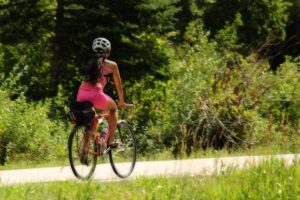Our Boston bicycling safety advocates know that words can have a great deal of power. In order to be effective in our efforts to promote safety of those who travel by bicycle, whether for daily commute or in leisure, it’s imperative to properly frame the issues, the challenges and the people involved. 
The power of smart language can be compelling, as evidenced by a recent blog post published as part of the Green Lane Project, a venture of the Seattle bicycle advocacy group PeopleForBikes.org. Writer Michael Andersen notes that rather than using the word, “cyclist,” it’s better to talk about “people on bikes.” Rather than use the word, “accident,” the word “collision” packs a more potent punch. And we can drive the point home better with a phrase like “protected bike lane” instead of “cycle track.”
Why do these seemingly minor changes matter? Some might view these fixes as trivial, but its effect is evident when we look at the so-called “war on cars” that was reportedly raging in Seattle just a few years ago. That three-word phrase was dominating the conversation about improvements to bicycle infrastructure in the city. Instead of discussing whether it should be safer for people to walk, bike or ride public transit, they were instead debating whether they should give in to demands to “make driving worse.” What should have been a winning issue for everyone became a losing issue all-around. But that shifted when a small non-profit group stepped in to champion a city-wide network of local streets that were low traffic and safer for those on bikes. And instead of calling themselves “biking advocates,” they labeled themselves “neighborhood advocates.”
They started changing the dialogue with every interview, every blog post, every meeting with a public official or public speech. Instead of saying “drivers” or “cars,” they began using the phrase, “people driving.” Instead of saying, “cyclist,” it was “people biking.” Instead of “pedestrians,” it’s “people walking.”
Some journalists may bristle just a bit because they are constantly searching for the most succinct way to turn a phrase. But it’s important to drive home the point that by just adding one more word, the entire dynamic shifts. We humanize everyone involved.
It’s the same sort of concept when we say, “disabled person.” Many in the special needs community are quick to assert that the “personhood” aspect should always come first. That’s why they prefer the phrase, “person with a disability.”
Further, when we start categorizing people as “drivers,” “cyclists” or “pedestrians,” we’re making it very tribal. But when you can frame it to show we are all part of the same tribe, it reduces the animosity and fosters better working relationships. Someone on a bike isn’t automatically opposed to everyone in a motor vehicle – or visa versa.
Shifting the conversation in this way changed what was historically an acrimonious – and not productive – debate into one that actually became fruitful. Today, about five years later in Seattle, many residents – those who drive and those who bike – will explain how they are fervent believers that streets should be safe and accessible for everyone. It’s a neighborhood issue, not a “cyclist” issue.
This whole approach is something we have adopted as well. At BikeAttorney.com, our clients are aren’t simply opting for “alternative transportation. They “choose to bike because it’s healthier/ better for the environment.” Further, they are not just “bikers” or “cyclists,” they are “people on bikes.”
If you or someone you love has been injured in a Boston bicycle crash, call for a free and confidential appointment at 617-777-7777.
Additional Resources:
Don’t Say ‘Cyclists,’ Say ‘People on Bikes’, Feb. 15, 2017, By Sarah Goodyear, CityLab.org
More Blog Entries:
New Massachusetts Law Bans Parking in Bicycle Lanes, Jan. 20, 2017, Boston Bike Injury Lawyer Blog
 Bike Accident Lawyers Blog
Bike Accident Lawyers Blog

